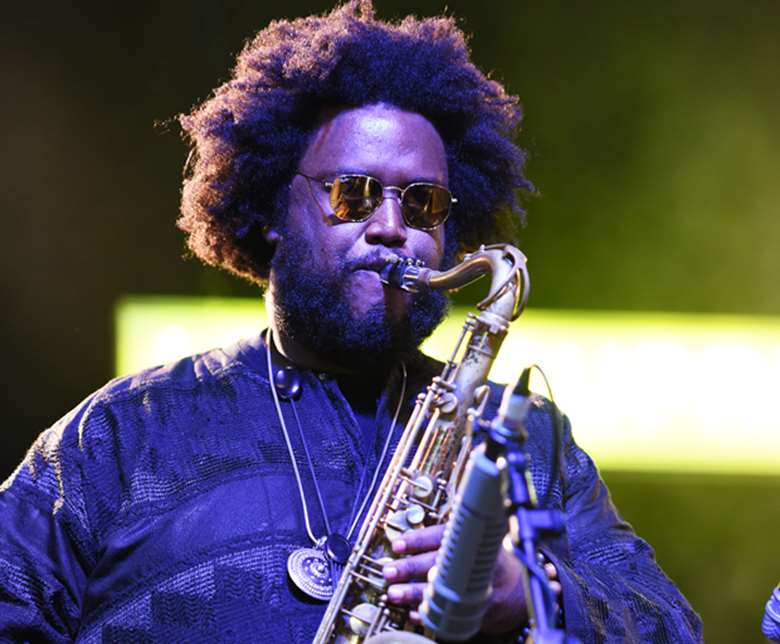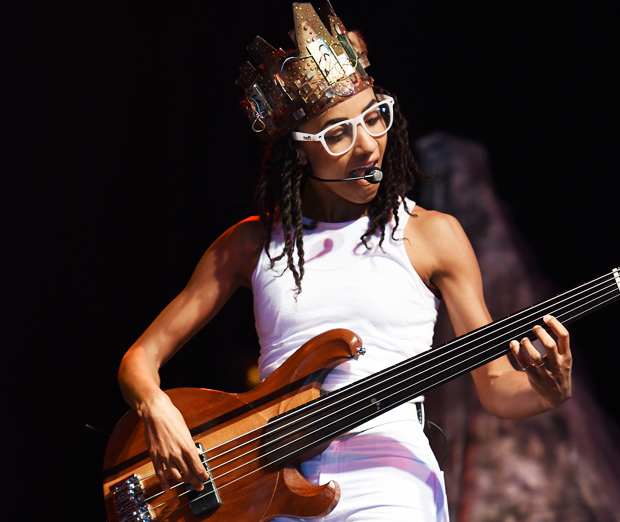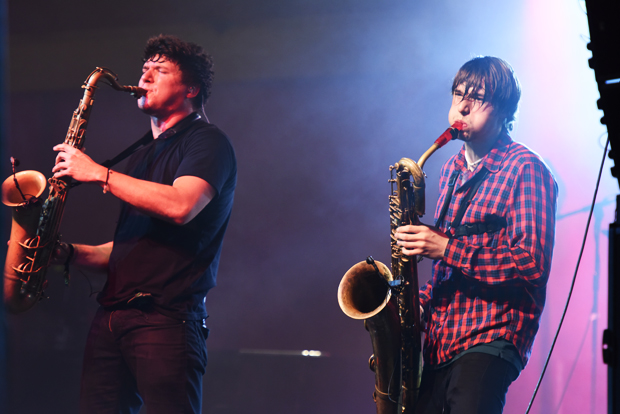Kamasi Washington wows at Love Supreme
Monday, July 4, 2016
In the packed-out, pumped-up Big Top tent, the four sacred notes of the Coltrane tune which gave this festival its name and ethos are being picked out.

Kamasi Washington called his album The Epic, his band the Next Step, and the song which now follows that Coltrane nod, ‘The Rhythm Changes’. This could all be the most arrogant hubris, from a saxophonist who’d surely never claim to near Coltrane’s radical evolution of the instrument. Really, though, it’s just a way of letting people far outside jazz’s usual circles know that something’s happening here. And that something peaks in this last song of a charged, hugely uplifting set. There’s Sgt. Pepper psychedelia from the brass, and a thickening sense of ecstasy, stoked by Patrice Quinn ritually invoking “our love, our beauty, our genius”. It ends a set which began in a chaotic avant-funk maelstrom, showcasing bassist Miles Mosley’s effectively bombastic ‘Abraham’, Tony Austin and Ronald Bruner Jnr’s duelling drums and Washington’s genial, audience-warming yarns. Now with this finish, spiritual jazz’s baton is picked up for a new generation, ascending as something lighter and brighter than before, with a warm Californian accent. ‘The Rhythm Changes’ suggests the open-handedness of Washington’s musical commune, implicitly welcoming soul, funk and hip-hop. Hands are up in affirmation all over the tent at the end. I open my mouth to testify, but find I’m already hoarse.
Binker and Moses also touch on the legacy of Coltrane and Elvin Jones. The British duo whose Dem Ones was a standout debut in 2015 are Binker Golding, a tenor saxophonist with Coltrane’s thick, sometimes romantic tone, and drummer Moses Boyd, a loose-limbed, steaming funk engine. This hardcore jazz format draws a big, appreciative, dancing crowd. Amid the high-energy intensity, there’s a moment where keeping time becomes a suspended, floating act, like a hummingbird hanging in mid-air.

Cécile McLorin Salvant finds her own grace, as the singer hovers dreamily over pianist Aaron Diehl’s descending piano ripples during ‘Mad About the Boy’. Her band makes soft, simmering American Songbook blues with an elegantly controlled, classic jazz vocalist. On Blanche Calloway’s ode to a perfect bad boy, ‘Growlin’ Dan’, Salvant tears it up with growling sexuality, too. She’s followed on Saturday by Esperanza Spalding’s Emily’s D+ Evolution concept show. Spalding never breaks from the quizzical, oppressed character she created for her new, art-rock-jazz album, and an initial, dense rock dynamic adds to its alienating character. Stick with Emily’s journey, though, and Spalding’s lilting bass and voice break free. Her final prayer for “unconditional love” is suddenly moving, like Patrice Quinn’s mantras later.

Brooklyn’s Moon Hooch are a wholly different, startling hit, combining dance music’s reliably cresting shape with jazz’s raw unpredictability. Dynamics familiar from raves and the band’s rousing, leaping energy create an instant, hands-in-the-air triumph. At times they’re essentially a jazz piano trio, drawing massive roars for an alto sax solo, in an exhilarating, ballsy crossover. GoGo Penguin have been down this path already, of course. Their relentless, recycling riffs are relaxed this time, lessening excitement, but letting their musicianship breathe. The pace can still be breakneck, Nick Blacka’s bass runs an understated marvel. ‘Samara’ is melancholy motorik, Chris Illingworth picking out a pensive piano melody as Rob Turner’s drums flash past like a bullet-train.
There's a former Miles alumnus, too, with John Scofield joining Mehliana, who don’t always take off, but finish with a near-country-rock ballad, Brad Mehldau at the piano and Scofield playing a warmly emotional solo and Mark Guiliana beating out a softer rhythm at the kit. The Stanley Clarke Band find fast, jagged rhythms in ‘Goodbye Pork Pie Hat’, and sometimes recall Clarke’s 1980s salad days in dated fashion. The setting, though, inspires him to finish with ‘Song to John’, and the imprecation: ‘Remember Coltrane.’

I find Jacob Collier’s virtuoso one-man band wearing as much as astonishing. But you can always retreat to the Bandstand, and sit and drink in the rolling downland. This ancient English setting has likely never seen crowds as diverse in age, race and gender as the polyglot thousands at Love Supreme. No jazz club has seen as many women, either, ready to show a startled Binker and Moses that they’re playing dance music. The dystopia forced through by Brexit, like jazz’s doomsayers, are both denied by the sunny mix of tradition and radicalism here.
– Nick Hasted
– Photos by Michael Putland - see more photos on Michael's website michaelputland.com/love-supremejazz-festival-2016/